Empowering Families for Better Outcomes in ABA Therapy
Parent-centered approaches have revolutionized ABA therapy by actively involving families in meaningful ways that promote sustainable progress for children with autism. This comprehensive strategy recognizes parents as vital partners, whose engagement enhances treatment efficacy, promotes consistency, and fosters stronger familial bonds. As we explore how these approaches optimize results, we will delve into various methods, benefits, and evidence supporting the pivotal role of family in autism intervention.
Methods and Best Practices for Involving Parents in ABA Therapy
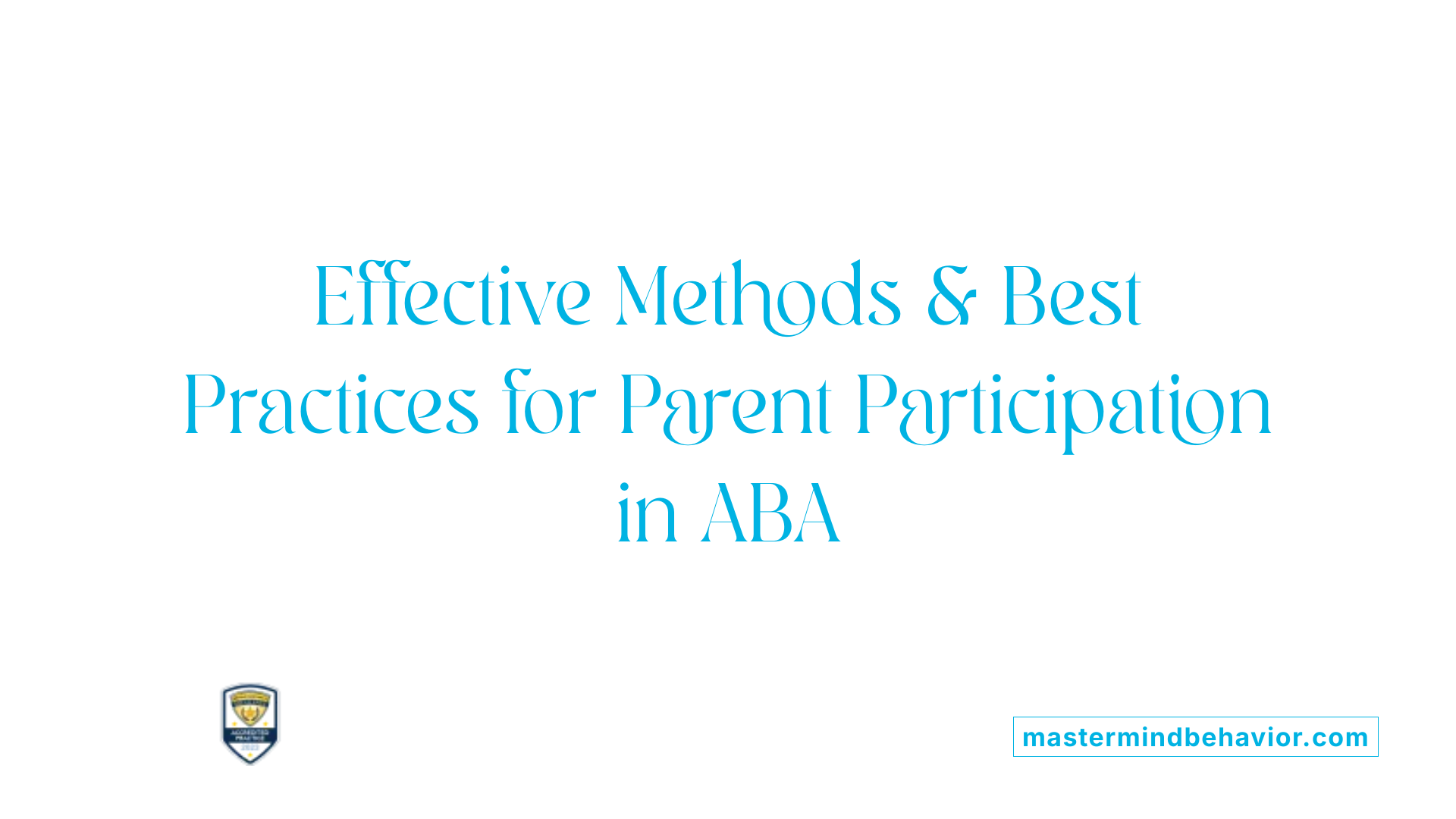
What methods and best practices are used for involving parents in ABA therapy?
Involving parents effectively in Applied Behavior Analysis (ABA) therapy is crucial for maximizing a child's progress. One of the primary approaches is offering comprehensive parent training programs that equip them with practical ABA techniques. These programs often cover essential strategies such as positive reinforcement, prompting, and meticulous data collection. By learning these methods, parents can consistently reinforce desirable behaviors across different environments.
Regular collaboration between parents and therapists is also fundamental. This includes maintaining open lines of communication, participating in therapy sessions, and engaging in joint goal setting. Such collaboration helps parents understand their child's unique behaviors and how best to support skill development at home.
Utilizing visual aids and modeling techniques enhances the learning process. Visual schedules, social stories, and video demonstrations serve as tangible tools that make ABA strategies easier to grasp and apply. Consistent routines and structure at home further support skill generalization, ensuring behaviors learned during therapy extend into everyday life.
Creating an inclusive, family-centered approach involves the development of comprehensive parent guides, organizing workshops, and actively encouraging parental involvement in treatment planning. These activities empower families, giving them confidence and competence to manage behaviors effectively.
Fostering open communication and celebrating each milestone or improvement nurture a positive partnership. Recognizing progress motivates both parents and children, strengthening the therapeutic alliance and promoting ongoing engagement.
In summary, by combining structured training, collaborative planning, visual supports, and ongoing communication, parents become essential partners in their child's ABA therapy journey. This integrated approach not only enhances learning and behavior change but also builds a supportive environment that benefits the entire family.
The Impact of Parent-Centered Approaches on Therapy Effectiveness
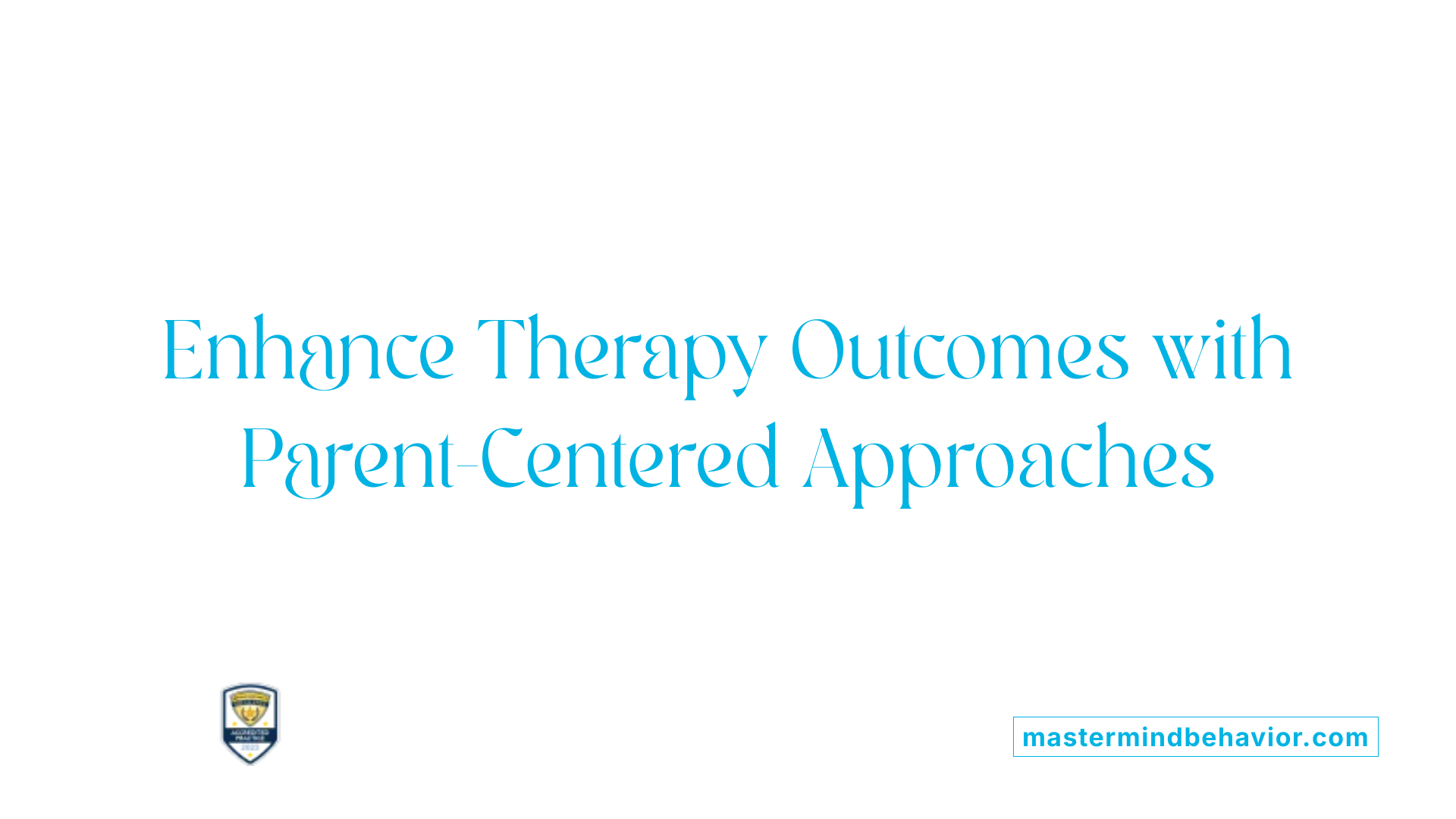
How can parent-centered approaches improve therapy effectiveness for children with autism?
Involving parents actively in ABA therapy significantly boosts its effectiveness for children with autism. These approaches provide caregivers with firsthand experience and understanding of therapeutic techniques, which increases the child's exposure to consistent intervention strategies across different environments.
Parent-centered methods, such as Project ImPACT and JASPER, focus on enhancing critical social, communication, and play skills. When parents are equipped with the right skills through training sessions, they can reinforce learning at home and in community settings, leading to better generalization of skills.
One important benefit of these approaches is the reduction of caregiver stress and burden. By involving parents directly in the therapy process, they gain confidence and a clearer understanding of how to manage behaviors, which lessens feelings of helplessness and anxiety.
Furthermore, models like telehealth and family-centered planning expand access to ABA. These models support ongoing training and supervision, making therapy more flexible and tailored to each family's schedule and needs.
Mindfulness and acceptance-based interventions also play a role in improving parental mental health. When parents learn coping strategies to manage stress, their emotional well-being improves, which positively impacts their ability to support their child's development.
Despite promising findings, most research highlighting these benefits emphasizes the need for standardized, large-scale studies to draw definitive conclusions. Nonetheless, integrating parent-centered strategies remains a promising avenue for maximizing therapy outcomes and creating a supportive environment for children with autism.
Benefits of Parent Training in ABA
What are the benefits of parent training in ABA?
Parent training in Applied Behavior Analysis (ABA) offers a wide range of advantages that significantly impact a child's developmental trajectory. One of the primary benefits is an enhanced understanding of ABA principles. Parents learn how behavioral interventions work, enabling them to identify, reinforce, and modify behaviors effectively.
By gaining this knowledge, parents become active participants rather than passive observers. They acquire practical skills to recognize behavioral triggers and implement strategies that encourage positive behaviors within everyday environments. This active involvement supports consistent reinforcement at home, aligning with therapy goals and fostering meaningful progress.
Moreover, parent training facilitates the generalization of skills beyond therapy sessions. Children tend to demonstrate better retention and application of learned behaviors when parent-led reinforcement occurs in natural settings like home, school, and community environments. This consistency promotes long-lasting improvements, often sustaining gains for 12 to 14 months after formal services conclude.
In addition, involving parents extensively supports long-term success. Research indicates that parent training leads to meaningful improvements across multiple developmental domains, including communication, social skills, and adaptive behaviors, which are critical for overall functioning.
Active participation plays a vital role in effective interventions. Parents involved in training sessions, regular team meetings, and ongoing data collection can monitor progress closely. They contribute valuable insights into their child's behavior patterns and response to strategies, allowing therapists to tailor interventions precisely to individual needs.
Furthermore, parent-led ABA models, such as the pBT Forta model, demonstrate that with extensive training and supervision, parents can deliver effective interventions, increasing treatment accessibility. Technology tools like mobile apps help parents record behaviors, monitor progress, and maintain high fidelity in implementation.
Empowerment and improved communication within families are additional benefits. Parent training fosters stronger family bonds through shared activities and collaborative goal setting. It enhances emotional support, reduces parental stress, and boosts confidence in managing challenging behaviors.
Overall, parent training makes ABA therapy more effective and sustainable. It bridges logistical barriers—such as geographical limitations and workforce shortages—by enabling parents to deliver consistent intervention strategies. This holistic approach creates a supportive environment that encourages continuous learning and development for children with autism.
The Significance of Family Engagement in ABA Therapy
Why is family engagement important in ABA therapy?
Family involvement plays a crucial role in the success of ABA (Applied Behavior Analysis) therapy for children with autism. When parents actively participate, they help reinforce positive behaviors and learned skills across different settings, which promotes better generalization and stability of progress. Consistent support at home complements therapy sessions, creating a seamless learning environment.
Training parents in ABA methods empowers them to be active partners. This not only increases their confidence but also ensures that intervention strategies are implemented correctly and consistently. Parents who understand the principles of ABA can effectively support their child's developmental journey, leading to faster progress.
Beyond reinforcement, family engagement allows for the identification of meaningful goals that are tailored to the child's unique needs and family values. Such personalized targets foster motivation and relevance, which can enhance learning outcomes.
Moreover, involving families fosters stronger emotional bonds, providing both the child and the family with a supportive environment. Active participation in goal setting, therapy activities, and progress monitoring creates a collaborative approach that benefits everyone's well-being.
Ultimately, the integration of family involvement in ABA therapy leads to more sustainable improvements in communication, social skills, and adaptive behaviors. It builds a foundation for lasting change, making therapy more effective and enriching for the child's overall development.
How Parental Involvement Impacts ABA Programming and Outcomes
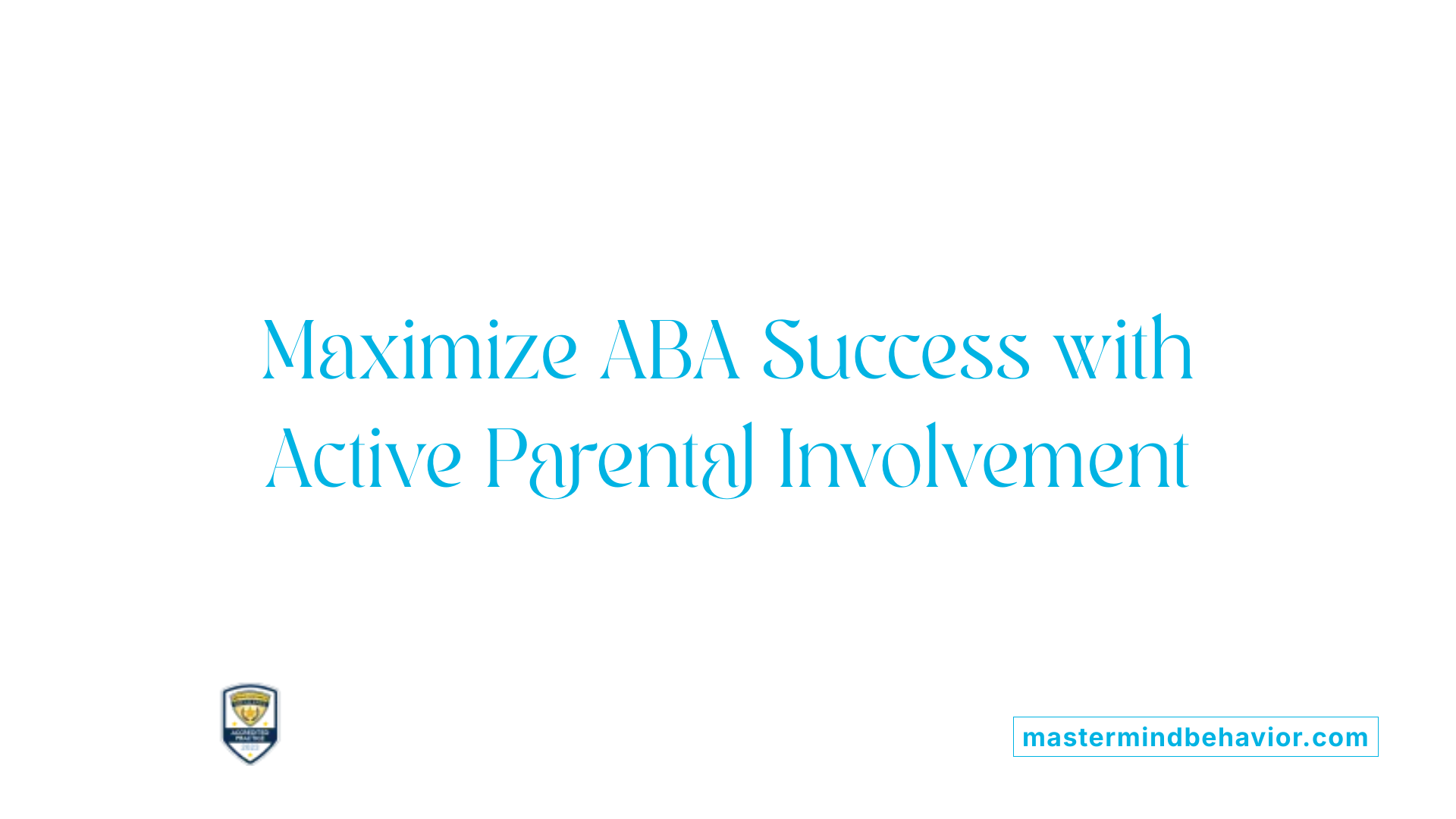
How does parent involvement affect ABA programming?
Involving parents actively in ABA therapy significantly boosts its effectiveness by ensuring consistency across different settings like home, school, and the community. When parents participate in therapy through structured training and regular communication, they become well-equipped to reinforce skills and strategies learned during sessions. This not only accelerates children's progress but also helps in maintaining gains over time.
Parents who are engaged in the process tend to develop a deeper understanding of their child's unique behaviors, triggers, and needs. This knowledge empowers them to tailor interventions in ways that are most beneficial. Moreover, collaborative goal setting allows both therapists and parents to focus on meaningful objectives, making therapy more personalized and relevant.
Open lines of communication facilitate ongoing adjustments to strategies and help address any challenges quickly. When parents understand and incorporate ABA principles effectively, they create a stable and predictable environment for the child, which is crucial for skill generalization and long-term retention.
Furthermore, parental involvement nurtures stronger family bonds through shared therapeutic activities. This emotional support fosters increased motivation and engagement from the child, leading to better outcomes. Addressing barriers such as scheduling conflicts, transportation issues, or geographical limitations through flexible models and ongoing support ensures sustained parent participation.
Overall, active parental involvement is vital for amplifying the success of ABA therapy. It creates a cohesive, supportive environment that promotes continuous learning, skill generalization, and meaningful progress, ultimately leading to more positive long-term developmental outcomes for children with autism.
The Expected Outcomes of ABA Therapy and the Role of Families
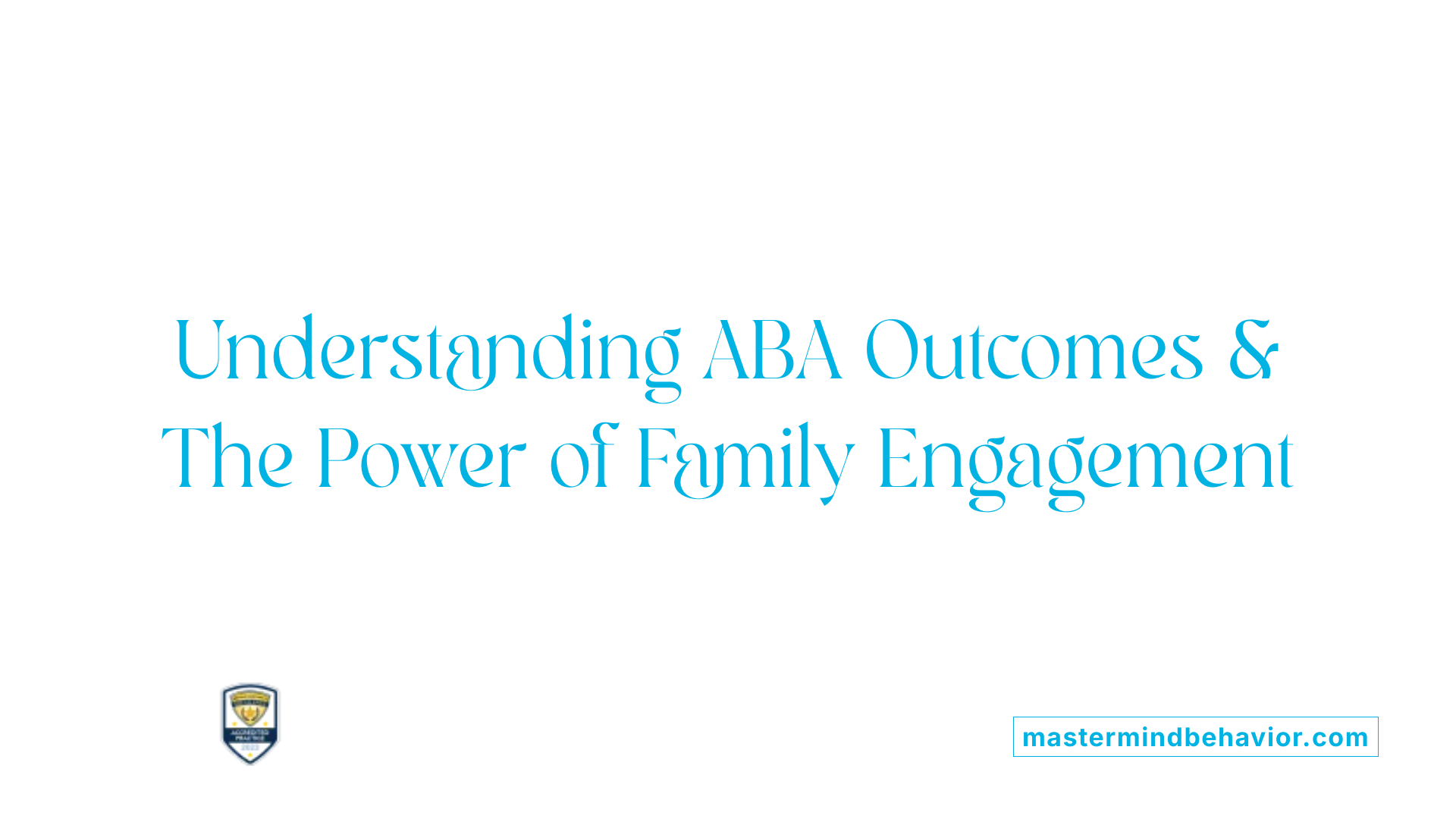
What are the expected outcomes of ABA therapy?
ABA therapy, or Applied Behavior Analysis, is a proven approach tailored to improve various skills and behaviors in children with autism spectrum disorder (ASD). Research indicates that it can foster significant progress across multiple areas of development.
One of the primary outcomes is the enhancement of intellectual functioning and language skills. Many children working through ABA programs demonstrate better communication abilities, allowing them to express their needs and participate more actively in social interactions. This improvement not only supports their emotional well-being but also increases their independence.
Daily living skills such as dressing, eating, and personal hygiene are frequently targeted within ABA interventions. As children gain these skills, they become more capable of managing daily tasks independently, which is vital for their overall quality of life.
Another critical outcome is the improvement of social interactions. Children learn to engage more effectively with peers, family members, and community members. This progress often results in increased participation in community activities and better peer relationships.
While individual results can vary, the collective evidence supports that ABA therapy can substantially boost a child's developmental trajectory, leading to more meaningful engagement with their environment and a higher level of independence.
How does parent involvement influence therapy outcomes?
Parents who actively participate in ABA therapy understand their child's unique behaviors, triggers, and needs better. Consistency between therapy sessions and home practices reinforces positive behaviors and accelerates progress.
Family-centered ABA therapy empowers parents by providing instruction and skills training. When parents are confident in applying ABA strategies, they can create a structured, supportive environment that promotes skill generalization across different settings.
Moreover, involving parents facilitates better tracking of progress, allowing therapists to tailor interventions effectively. Parents' feedback helps refine goals and strategies, ensuring the therapy remains personalized and impactful.
Strong family bonds can also be strengthened through shared therapeutic activities, fostering emotional support and reducing parental stress. The presence of parents during therapy provides emotional reassurance to children, improving their engagement and motivation.
Best practices for maximizing therapy effectiveness with family involvement
Achieving optimal results relies on several collaborative practices:
- Regular parent training sessions to deepen understanding of ABA principles.
- Open communication channels between parents and therapists.
- Active participation of parents in setting and reviewing goals.
- Consistent implementation of reinforcement strategies at home.
- Structured home environments aligned with therapy strategies.
These practices promote a consistent approach, which research suggests significantly enhances communication, social skills, and adaptive behaviors.
The impact of family-centered ABA on children’s development
Numerous studies underscore the positive effects of family-centered ABA programs. Children involved in these approaches tend to show considerable improvements in communication, socialization, and daily living skills.
Parents report increased satisfaction and confidence in managing their child's behaviors. They also observe meaningful progress, which motivates sustained engagement and reinforces positive family dynamics.
By emphasizing family involvement, ABA therapy becomes a holistic process that benefits not just the child's development but also strengthens family bonds and creates a more supportive environment for managing autism.
Innovative models supporting parent-led ABA treatment
Emerging models like the parent Behavior Therapist (pBT) Forta demonstrate how parent-led ABA can effectively deliver interventions. These models involve extensive training and supervision from qualified clinicians, ensuring treatment fidelity.
Using technology, such as dedicated mobile apps, parents can record and monitor treatment progress conveniently. This setup facilitates high-quality data collection and consistent intervention delivery.
Research indicates that children treated through parent-led models like pBT show clinically meaningful improvements, especially in socialization, communication, and daily living skills, as measured by assessments like Vineland-3 scores.
Higher treatment utilization rates within these models correlate with better outcomes, highlighting the importance of consistent engagement.
The importance of parent training and intervention duration
Meta-analyses suggest that parent training interventions, whether rooted in behavioral or mindfulness-based approaches, can reduce ASD core symptoms, disruptive behaviors, and parental stress.
Optimal intervention durations range from five to eight weeks, providing enough time for meaningful change.
Delivery modes involving exclusive parent participation tend to yield the most significant improvements, as parents can consistently reinforce strategies at home.
Supporting the child through a family-centered approach
Parents are encouraged to educate themselves through workshops, online resources, and reading materials aligned with ABA principles. Their active involvement in therapy sessions, goal setting, and home practice plays a crucial role in success.
Creating a predictable environment at home that reflects ABA strategies helps reinforce desired behaviors and reduces anxiety.
Utilizing positive reinforcement tailored to what motivates the child fosters engagement and learning.
Practicing skills across different settings supports generalization, ensuring skills are not context-specific. Keeping detailed records allows therapists to adapt interventions more effectively.
Building reciprocal communication with therapists, participating in community groups, and seeking support from other parents can provide emotional resilience and practical knowledge.
How family involvement enhances long-term development
Engagement of families in ABA creates a well-rounded, supportive system that fosters sustainable growth.
Children benefit from consistent reinforcement and opportunities to generalize skills, leading to improved adaptive behaviors.
Strong family involvement often results in better emotional well-being for both children and parents, making therapy a collaborative and empowering experience.
| Aspect | Focus Area | Description |
|---|---|---|
| Communication | Language development | Improved speech and comprehension skills |
| Social Skills | Peer and community interaction | Better engagement and relationship-building |
| Daily Living | Independence | Personal care and home routines |
| Family Impact | Bonds and support | Strengthening emotional connections |
| Therapy Models | Parent-led programs | Effective delivery with technological support |
| Evidence | Research outcomes | Demonstrated improvements in adaptive skills and behavior |
| Parental Benefits | Confidence and stress | Increased confidence and reduced parental stress |
This comprehensive approach ensures that children with ASD gain meaningful skills while fostering resilient, informed, and supportive family environments.
The Influence of Parent Training on Stress Reduction and Family Dynamics
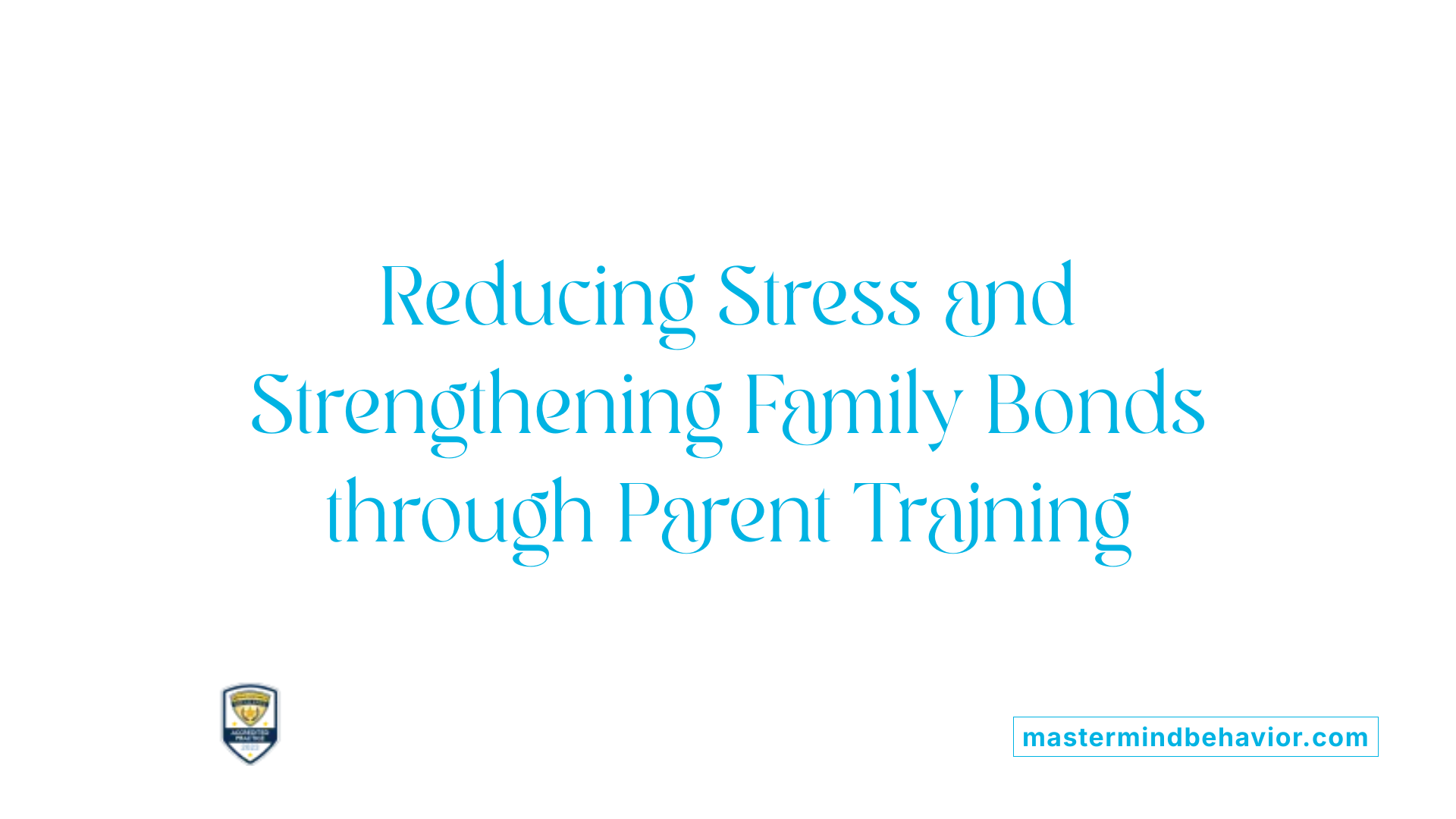
What parent-focused interventions have shown positive effects on reducing stress and improving parent-child relationships?
Research indicates that involving parents directly in ABA interventions brings multiple benefits, especially regarding their mental health and family dynamics. Parent-focused programs have demonstrated significant positive effects on reducing parental stress, depression, and emotional distress. For example, meta-analyses reveal that after participating in targeted training, parents experience notable decreases in stress levels (Hedge’s g=−1.26), depressive symptoms (g=−0.71), and overall distress (g=−0.44). These improvements foster a more supportive environment for children.
Interventions based on mindfulness and acceptance commitment therapy (ACT) have shown particular promise. These approaches help parents manage their own emotional responses better, thus enabling them to support their children more effectively. Such programs are especially effective when delivered over a period of five to eight weeks, ensuring enough time for skills to develop and be integrated into daily life.
Modes of delivery matter as well. Parent-only programs that focus on building skills and emotional resilience tend to produce the best results, as they allow parents to focus entirely on their training without the added complexity of coordinating with professionals during sessions.
Enhanced parent-child relationships are another important outcome, with improved communication, reduced problem behaviors, and greater emotional bonds. The improvements in familial interactions promote a positive atmosphere, which supports the child's development and the child's ability to generalize skills learned in therapy.
In sum, engaging parents through well-structured, psychologically grounded interventions significantly reduces stress and improves the family dynamic, creating a more stable and nurturing environment for children with autism.
Fostering Long-Term Success Through Family-Centered Strategies
The evidence overwhelmingly supports that parent-centered approaches significantly enhance ABA outcomes for children with autism. By actively involving parents through education, training, and collaboration, these strategies create a supportive ecosystem conducive to consistent intervention, skill generalization, and emotional bonding. As ABA evolves, integrating family-centered models like parent-led treatments offers a promising path to overcoming logistical barriers, enriching family relationships, and ensuring sustainable progress. Continued research and practice refinement will further solidify the crucial role of families in shaping positive futures for children with autism, emphasizing that when parents are empowered partners, the potential for meaningful change is vastly amplified.
References
- ABA Therapy in Center: How Involving Parents Makes a Difference
- Family-Centric Applied Behavior Analysis Facilitates Improved ...
- The effectiveness of parent training for children with autism spectrum ...
- Effectiveness of parent-focused interventions for improving the ...
- The Role of Family in ABA Therapy: Tips for Parents
- Parental Involvement in ABA Therapy for Children with Autism
- Impact of ABA Therapy: The Key Role of Parental Involvement
- ABA Parent Training Programs for Children with Autism
- Unleashing the Power of Parent Involvement in ABA Therapy








